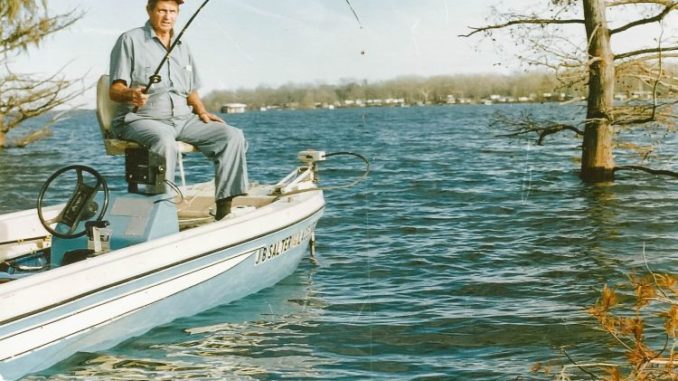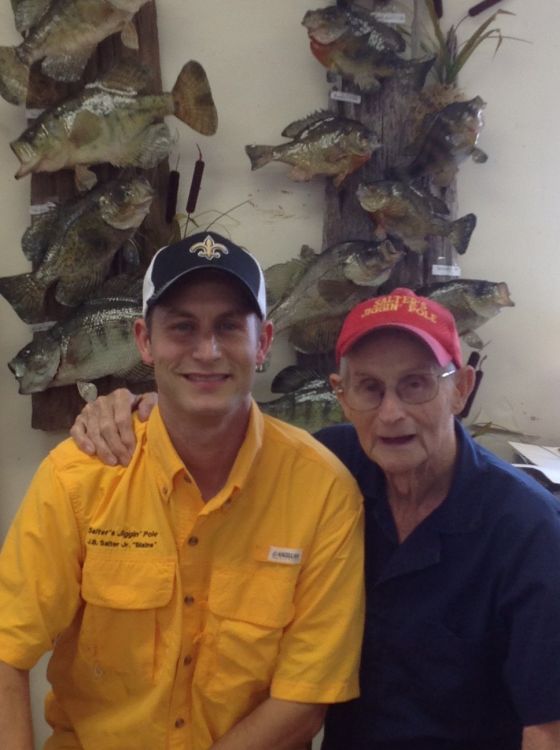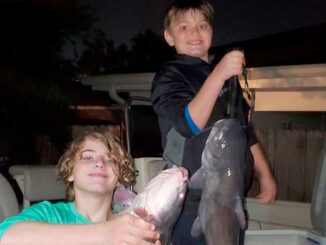
The late James Blaine “J.B.”Salter Sr. didn’t set out to be a fishing pole maker. Rather, he was a businessman who loved to fish — but still a businessman first.
J.B. and his brother Weyman operated an automobile service station in Erwinville, which they inherited from their father Josey James (J.J.) and mother Eloise.
For the Salter family, the words “service station” covered a lot of ground. Included in the business was a restaurant, bar, pool hall, community swimming pool and a round-the-clock Friday to Monday card-playing room.
If those weren’t attractions enough, they had a snake and alligator farm, complete with its own monkey. (Another roadside snake farm in Laplace had a chimpanzee that was billed as a gorilla and would smoke any and all cigarettes it could beg off of visitors.)
When the service station business fell on hard times because traffic was diverted around Erwinville by Interstate 10, the brothers changed businesses.
J.B. and his second wife Betty operated a Western Auto store. Brother Weyman opened a sporting goods store. Both businesses operated from 1975 until 1991.
J.B. had a passion for fishing that began when his father started taking him at 5 years old. That passion led to the fishing pole business.
By the time the store was sold, J.B. was well into fishing pole development. His first version — around 1980 — was a bamboo cane pole with eyes sewed onto the pole.
In 1984, J.B. made two big steps. First, he moved to fiberglass for pole construction. Secondly, he began to guide fishing trips.

Blaine remembers that during prime fishing time for sac-a-lait (March through May), his father would do one to three guide trips a week, plus one “fact-finding mission” weekly to find where the sac-a-lait were biting best.
By 1995, most (but not all) of the jigging poles J.B. produced were built of graphite, which he described as lighter, harder and more sensitive than fiberglass.
He changed again in 2003 to a lighter model of graphite, something resembling the pole of today.
J.B. touted two unique elements of his poles. The reel was mounted so that when the pole was properly held, the guides were positioned on one side of the pole rather than on top, keeping the line from contact with the pole itself. The intent was to maximize sensitivity, allowing the angler to feel the lightest tap when fishing tight-line.
Also, Salter Jiggin’ Poles were built with a counterweight on the butt end to reduce angler fatigue on a long fishing trip.
Both features are still found on today’s poles.
“In Dad’s day,” Blaine said, “the poles were built by hand, one at a time, in his shop. With four to six workers, he could turn out eight to 10 poles per day.
“People could buy them at one of about 65 small, independent retailers or by coming to the shop in person, which many did.”
The business suffered eight or nine years ago when Betty’s health took a downturn. Not only did the business languished, but J.B.’s fishing did, as well.
He stopped fishing completely the last five years of life before dying at 86.
Son Blaine has made changes in his attempt to rebuild the business on the foundation his father laid. Production has been outsourced overseas, where rods are built to meticulous specifications.
With the supply end taken care of, the younger Salter can concentrate on expanding sales by going to trade shows, where he teaches customers one-on-one, and through how-to videos on the internet.
In going to shows, Salter is following in his father’s footsteps. From age 7, he attended every outdoor show with J.B.
“He was a natural-born salesman,” Blaine said. “Few people can teach the way he did.”
Plans are to maintain the venerable shop as a shipping and repair facility, to add more wholesale distributors and to expand internet sales.
